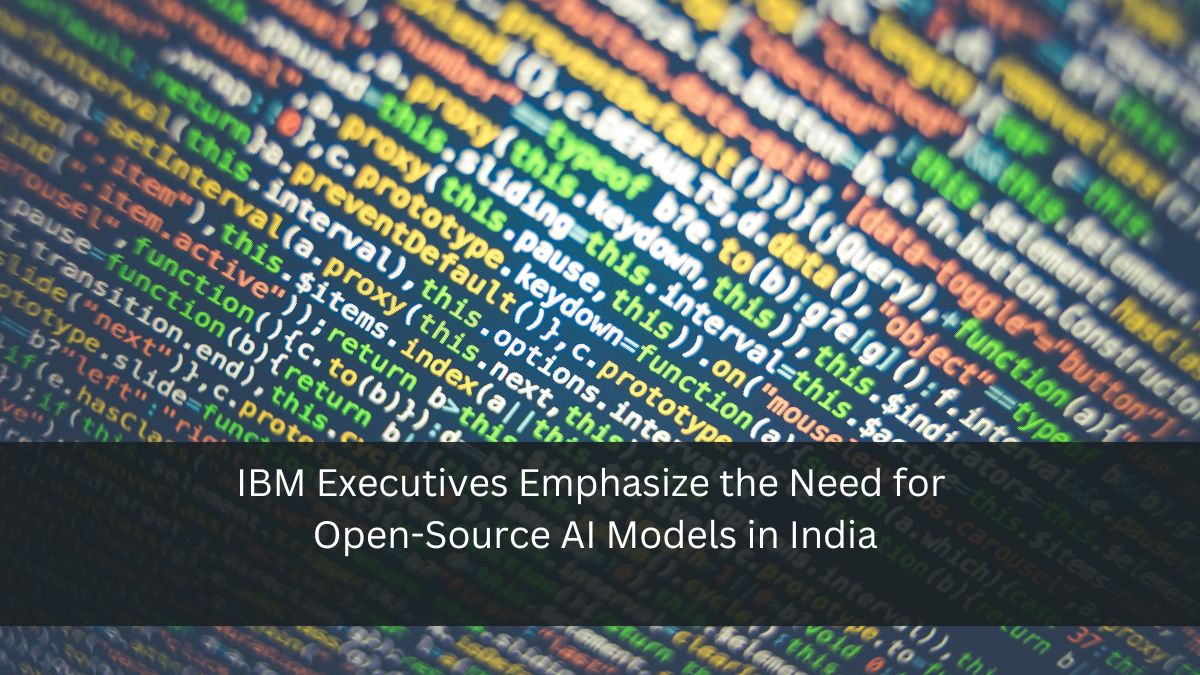AI
IBM Executives Emphasize the Need for Open-Source AI Models in India

In a recent media roundtable, two senior executives from IBM, the American multinational technology company, stressed the importance of developing open-source artificial intelligence (AI) models to ensure cultural and linguistic representation in India. Dario Gill, director of IBM Research, and Rob Thomas, senior vice president of IBM Software, highlighted the company’s commitment to an open innovation strategy when it comes to AI development.
The Importance of Open Innovation in AI
Gill emphasized that IBM’s core philosophy revolves around building and collaborating on an ecosystem for AI. He noted the phenomenal level of investment and energy happening across the AI ecosystem in India and underscored the significance of open innovation in enabling a “community endeavor.”
Given India’s vast linguistic diversity, Gill argued that no single company or institution could adequately address the challenges of representing various cultures in AI models. He suggested that by collectively driving more transparency in datasets, core architectures, and methodologies, a massive number of developers could be empowered to create models that accurately represent their cultures.
Aligning with Sovereign Capabilities
Thomas pointed out that an open-source focus aligns with the desire for sovereign capabilities among emerging markets like India. These countries seek to leverage the best technology in the world while maintaining control over their own destiny. He expressed IBM’s optimism about the Indian market, citing the country’s favorable demographic outlook and accelerating GDP growth as factors that create opportunities across areas such as data, automation, generative AI, cybersecurity, and sustainability.
Gill echoed this sentiment, stating that IBM’s open innovation strategy strongly resonates around the world as it provides the most economic dynamism and long-term independence in terms of technology strategies through AI.
Advancements in IBM’s AI Ecosystem
Approximately a year after introducing Watsonx, its AI and data platform for business, IBM announced updates to the assistant bots and expanded ecosystem access to the platform. The company plans to add third-party models and deepen its collaboration with AWS, Adobe, Meta, Microsoft, Mistral, and others to enhance capabilities.
Moreover, IBM introduced new AI-powered automation capabilities in response to the expected surge in app development driven by generative AI. Thomas emphasized that manual effort alone cannot manage the complexity and growth associated with the projected billion apps by 2028.
The Need for Cultural Representation in AI
As AI continues to advance and permeate various aspects of our lives, it is crucial to ensure that these technologies accurately represent the diverse cultures and languages they serve. In a country like India, with its rich tapestry of languages and cultural traditions, the development of open-source AI models becomes even more critical.
By fostering a collaborative and transparent approach to AI development, IBM aims to empower developers and organizations to create models that are sensitive to the nuances of different cultures and languages. This not only promotes inclusivity but also helps to mitigate the risk of biases and inaccuracies that can arise when AI models are developed in isolation.
Furthermore, the emphasis on open-source AI models aligns with the growing desire for sovereign capabilities among emerging markets. Countries like India seek to leverage cutting-edge technology while maintaining a degree of control and independence over their technological trajectory. By embracing an open innovation strategy, IBM aims to support this aspiration and contribute to the long-term economic dynamism of these markets.
The Future of AI in India
As India continues to invest heavily in AI and related technologies, the importance of cultural and linguistic representation cannot be overstated. The development of open-source AI models that accurately capture the diversity of the country’s population will be critical in ensuring that these technologies are inclusive, unbiased, and beneficial to all.
IBM’s commitment to open innovation and collaboration in the AI ecosystem sets a positive example for other technology companies operating in India and around the world. By working together to drive transparency, share knowledge, and empower developers, the industry can create AI models that truly reflect the richness and complexity of human cultures and languages.
As India’s demographic and economic outlook remains favorable, the opportunities for AI-driven innovation are vast. From data and automation to generative AI, cybersecurity, and sustainability, the potential applications of AI are limitless. However, it is essential that these advancements are grounded in a commitment to cultural representation and inclusivity.
In conclusion, the call for open-source AI models in India by IBM executives underscores the critical role that collaborative innovation plays in ensuring that artificial intelligence technologies accurately represent the country’s diverse cultures and languages. By embracing an open innovation strategy and fostering a vibrant AI ecosystem, India can harness the power of AI to drive economic growth, social progress, and technological advancement while maintaining its sovereign capabilities and cultural identity.
